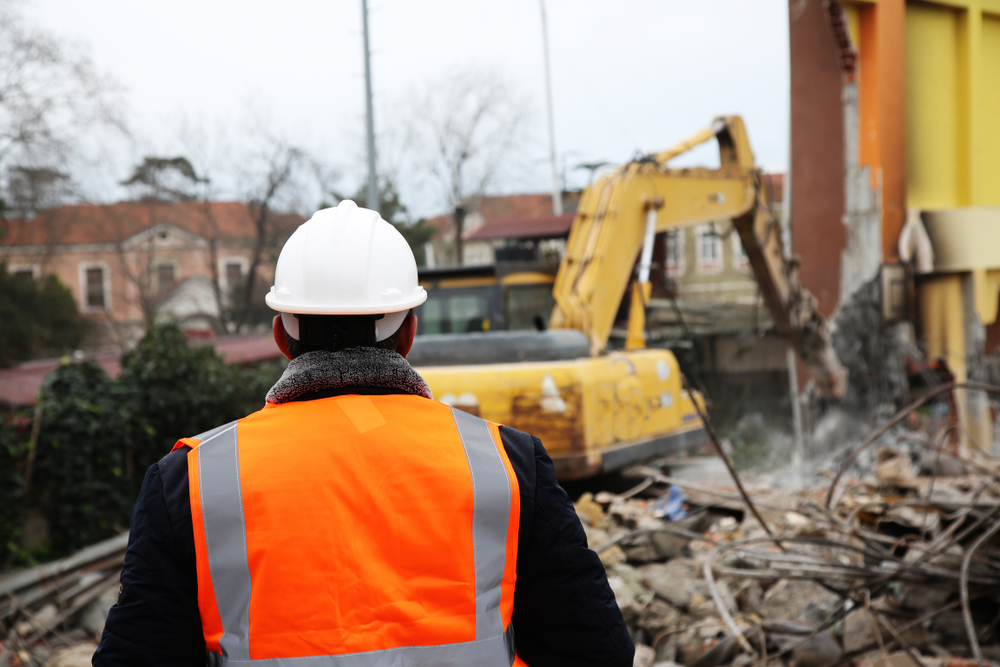The Occupational Safety and Health Administration (OSHA) cited two project contractors after a demolition contractor lost his legs when a concrete mezzanine platform on the west wall of a building at the former Boston Edison power plant in south Boston collapsed during demolition and asbestos abatement operations. Two other workers suffered injuries, the agency announced November 10.
The agency cited NorthStar Contracting for three willful violations, four serious violations, and one other-than-serious violation of workplace safety standards and proposed penalties totaling $399,864. OSHA alleged that NorthStar failed to:
- Inspect the demolition contractor’s work in the asbestos-regulated containment area to ensure compliance with all aspects of the asbestos standard.
- Ensure employees wearing respirators inside the asbestos containment areas did not have facial hair that came between the sealing surface of the facepiece and the face and/or interfered with valve function.
- Have a plan in place to prevent an unplanned collapse of the mezzanine.
- Conspicuously post the safe weight load limit on the mezzanine floor where demolition was being done and asbestos debris was being stored.
- Provide frequent and regular inspections inside the asbestos control area of the mezzanine.
The agency also cited the project’s Boston-based general contractor, Suffolk Construction Inc., for two willful and three serious violations and proposed penalties totaling $292,116. OSHA alleged that Suffolk Construction failed to take the same precautions as NorthStar.
“The employers in this case exposed employees to the immediate hazard of structural collapse and the potential long-term consequences of asbestos exposure,” James Mulligan, OSHA’s Boston south area director, said in an agency statement.
“These hazards are preventable and employers can control and eliminate them. Had they ensured proper planning–including engineering surveys and frequent and regular jobsite inspections, effective safety procedures, personal protective equipment, and employee training–was in place, this incident and the violations that followed might have been avoided.”
Chicago-area roofer cited for repeat fall protection violations
On November 10, OSHA also announced that a Calumet City, Illinois, roofing contractor exposed employees to deadly fall hazards at jobsites in Lake Zurich and Wheeling. Following three investigations, the agency cited Araujo Construction Corp. for 2 willful, 4 repeat, and 6 serious violations on May 5, August 22, and September 14.
OSHA proposed penalties totaling $277,584.
OSHA’s fall protection standard requires that guardrails, safety nets, personal fall arrest systems, or some combination of these be used during roofing activities at 6 feet (ft) or higher above lower levels. Agency inspectors informed company officials and a foreman at the Lake Zurich site on May 5 that they were violating federal law by allowing employees to work at heights of more than 30 ft without fall protection. On August 22, inspectors returned to the Lake Zurich worksite to find Araujo’s workers again exposed to fall hazards. On September 14, agency inspectors found the company committing similar violations at the Wheeling worksite, with employees working at heights over 15 ft.
OSHA inspectors also determined that Araujo Construction allowed workers to use ladders improperly and work on elevated platforms without fall protection. The company also failed to make sure workers using air-powered nail guns wore eye, head, and face protection, and the company did not provide training on the safe use of forklifts.
“Despite being warned by OSHA inspectors in May about their failures to protect employees from falls as federal law requires, Araujo Construction Corp. continued to show a callous disregard for the safety of its employees during two inspections in August and September,” Angeline Loftus, OSHA’s Chicago north area director, said in an agency statement.
OSHA’s construction industry fall protection standard has remained the agency’s most frequently cited standard for 12 years in a row, OSHA recently announced.

